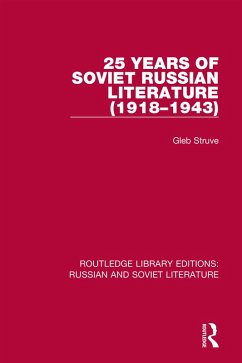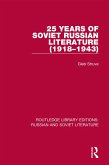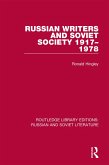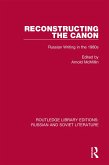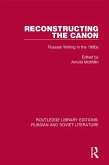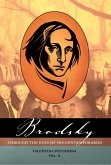Gleb Struve
25 Years of Soviet Russian Literature (1918-1943) (eBook, PDF)
34,95 €
34,95 €
inkl. MwSt.
Sofort per Download lieferbar

17 °P sammeln
34,95 €
Als Download kaufen

34,95 €
inkl. MwSt.
Sofort per Download lieferbar

17 °P sammeln
Jetzt verschenken
Alle Infos zum eBook verschenken
34,95 €
inkl. MwSt.
Sofort per Download lieferbar
Alle Infos zum eBook verschenken

17 °P sammeln
Gleb Struve
25 Years of Soviet Russian Literature (1918-1943) (eBook, PDF)
- Format: PDF
- Merkliste
- Auf die Merkliste
- Bewerten Bewerten
- Teilen
- Produkt teilen
- Produkterinnerung
- Produkterinnerung

Bitte loggen Sie sich zunächst in Ihr Kundenkonto ein oder registrieren Sie sich bei
bücher.de, um das eBook-Abo tolino select nutzen zu können.
Hier können Sie sich einloggen
Hier können Sie sich einloggen
Sie sind bereits eingeloggt. Klicken Sie auf 2. tolino select Abo, um fortzufahren.

Bitte loggen Sie sich zunächst in Ihr Kundenkonto ein oder registrieren Sie sich bei bücher.de, um das eBook-Abo tolino select nutzen zu können.
This book, first published in 1944, is a comprehensive survey of post-revolutionary Russian literature up to the early 1940s. A huge range of writers are examined, and as a wide-ranging analysis of Soviet literature, this book has rarely been bettered.
- Geräte: PC
- mit Kopierschutz
- eBook Hilfe
Andere Kunden interessierten sich auch für
![25 Years of Soviet Russian Literature (1918-1943) (eBook, ePUB) 25 Years of Soviet Russian Literature (1918-1943) (eBook, ePUB)]() Gleb Struve25 Years of Soviet Russian Literature (1918-1943) (eBook, ePUB)34,95 €
Gleb Struve25 Years of Soviet Russian Literature (1918-1943) (eBook, ePUB)34,95 €![Russian Writers and Soviet Society 1917-1978 (eBook, PDF) Russian Writers and Soviet Society 1917-1978 (eBook, PDF)]() Ronald HingleyRussian Writers and Soviet Society 1917-1978 (eBook, PDF)34,95 €
Ronald HingleyRussian Writers and Soviet Society 1917-1978 (eBook, PDF)34,95 €![Russian Writers and Soviet Society 1917-1978 (eBook, ePUB) Russian Writers and Soviet Society 1917-1978 (eBook, ePUB)]() Ronald HingleyRussian Writers and Soviet Society 1917-1978 (eBook, ePUB)34,95 €
Ronald HingleyRussian Writers and Soviet Society 1917-1978 (eBook, ePUB)34,95 €![Reconstructing the Canon (eBook, PDF) Reconstructing the Canon (eBook, PDF)]() Reconstructing the Canon (eBook, PDF)34,95 €
Reconstructing the Canon (eBook, PDF)34,95 €![Reconstructing the Canon (eBook, ePUB) Reconstructing the Canon (eBook, ePUB)]() Reconstructing the Canon (eBook, ePUB)34,95 €
Reconstructing the Canon (eBook, ePUB)34,95 €![Teffi (eBook, PDF) Teffi (eBook, PDF)]() Edythe HaberTeffi (eBook, PDF)35,95 €
Edythe HaberTeffi (eBook, PDF)35,95 €![Brodsky Through the Eyes of His Contemporaries (Vol 2) (eBook, PDF) Brodsky Through the Eyes of His Contemporaries (Vol 2) (eBook, PDF)]() Valentina PolukhinaBrodsky Through the Eyes of His Contemporaries (Vol 2) (eBook, PDF)130,95 €
Valentina PolukhinaBrodsky Through the Eyes of His Contemporaries (Vol 2) (eBook, PDF)130,95 €-
-
-
This book, first published in 1944, is a comprehensive survey of post-revolutionary Russian literature up to the early 1940s. A huge range of writers are examined, and as a wide-ranging analysis of Soviet literature, this book has rarely been bettered.
Dieser Download kann aus rechtlichen Gründen nur mit Rechnungsadresse in A, B, BG, CY, CZ, D, DK, EW, E, FIN, F, GR, HR, H, IRL, I, LT, L, LR, M, NL, PL, P, R, S, SLO, SK ausgeliefert werden.
Produktdetails
- Produktdetails
- Verlag: Taylor & Francis eBooks
- Seitenzahl: 370
- Erscheinungstermin: 15. Juni 2021
- Englisch
- ISBN-13: 9781000386271
- Artikelnr.: 61617968
- Verlag: Taylor & Francis eBooks
- Seitenzahl: 370
- Erscheinungstermin: 15. Juni 2021
- Englisch
- ISBN-13: 9781000386271
- Artikelnr.: 61617968
- Herstellerkennzeichnung Die Herstellerinformationen sind derzeit nicht verfügbar.
Gleb Struve
1. Pre-Revolutionary Writers After 1924 1.1. Literature and the Revolution
1.2. Bely 1.3. Gorky 1.4. A.N. Tolstoy 1.5. Ehrenburg 1.6. Veresaev 1.7.
Prishvin and Sergeyev-Tsensky 1.8. Zamyatin 2. Two Revolutionary Romantics
2.1. Babel 2.2. Vsevolod Ivanov 3. The Revival of the Novel 3.1. The
Serapion Brothers 3.2. Fedin 3.3. Leonov 3.4. Kaverin 3.5. Slonimsky and
Savich 3.6. Lavrenev, Malyshkin and Lebedenko 4. Writers of Everyday Life
4.1. Chroniclers of the Revolution 4.2. Seyfullina 4.3. Romanov 4.4. Lidin
4.5. Kataev 4.6. Zoshchenko 4.7. Ilf and Petrov 4.8. Levin and some others
5. The Proletarian Writers 5.1. From the 'Proletkult' to the Five Year Plan
and After 5.2. Gladkov 5.3. Panferov 5.4. Libedinsky 5.5. Fadeyev 5.6.
Sholokhov 5.7. Malashkin and others 6. Yury Olesha and His 'Envy' 7.
Literature of the Five-Year Plan 8. 'Counter-Revolutionary' Tendencies in
Soviet Literature 8.1. The 'Neo-Bourgeois' and 'Kulak' Spirit in Literature
8.2. Zamyatin's We 8.3. Pilnyak's Mahogany 8.4. Budantsev's Sufferings of
Mind 8.5. Bulgakov 9. The Historical Novel 10. The Poets 10.1. Decline of
Poetry 10.2. Mayakovsky and Esenin 10.3. Pasternak 10.4. Tikhonov 10.5.
Selvinsky and Constructivism 10.6. Bagritsky 10.7. Aseyev 10.8. Bezymensky
and Other Proletarian Poets 10.9. The Poets' Prose: Mandelstam, Pasternak,
Tikhonov 11. The Drama 12. Literary Criticism and Literary Theories 12.1.
Formalism 12.2. Sociological Method 13. Government Policy in Matters of
Literature 13.1. From 1918 to the Five Year Plan 13.2. The 'Reform' of 1932
and After 14. Latest Developments: Socialist Realism: Nationalism vs.
'Westernism' and 'Classicism' vs. 'Modernism'
1.2. Bely 1.3. Gorky 1.4. A.N. Tolstoy 1.5. Ehrenburg 1.6. Veresaev 1.7.
Prishvin and Sergeyev-Tsensky 1.8. Zamyatin 2. Two Revolutionary Romantics
2.1. Babel 2.2. Vsevolod Ivanov 3. The Revival of the Novel 3.1. The
Serapion Brothers 3.2. Fedin 3.3. Leonov 3.4. Kaverin 3.5. Slonimsky and
Savich 3.6. Lavrenev, Malyshkin and Lebedenko 4. Writers of Everyday Life
4.1. Chroniclers of the Revolution 4.2. Seyfullina 4.3. Romanov 4.4. Lidin
4.5. Kataev 4.6. Zoshchenko 4.7. Ilf and Petrov 4.8. Levin and some others
5. The Proletarian Writers 5.1. From the 'Proletkult' to the Five Year Plan
and After 5.2. Gladkov 5.3. Panferov 5.4. Libedinsky 5.5. Fadeyev 5.6.
Sholokhov 5.7. Malashkin and others 6. Yury Olesha and His 'Envy' 7.
Literature of the Five-Year Plan 8. 'Counter-Revolutionary' Tendencies in
Soviet Literature 8.1. The 'Neo-Bourgeois' and 'Kulak' Spirit in Literature
8.2. Zamyatin's We 8.3. Pilnyak's Mahogany 8.4. Budantsev's Sufferings of
Mind 8.5. Bulgakov 9. The Historical Novel 10. The Poets 10.1. Decline of
Poetry 10.2. Mayakovsky and Esenin 10.3. Pasternak 10.4. Tikhonov 10.5.
Selvinsky and Constructivism 10.6. Bagritsky 10.7. Aseyev 10.8. Bezymensky
and Other Proletarian Poets 10.9. The Poets' Prose: Mandelstam, Pasternak,
Tikhonov 11. The Drama 12. Literary Criticism and Literary Theories 12.1.
Formalism 12.2. Sociological Method 13. Government Policy in Matters of
Literature 13.1. From 1918 to the Five Year Plan 13.2. The 'Reform' of 1932
and After 14. Latest Developments: Socialist Realism: Nationalism vs.
'Westernism' and 'Classicism' vs. 'Modernism'
1. Pre-Revolutionary Writers After 1924 1.1. Literature and the Revolution 1.2. Bely 1.3. Gorky 1.4. A.N. Tolstoy 1.5. Ehrenburg 1.6. Veresaev 1.7. Prishvin and Sergeyev-Tsensky 1.8. Zamyatin 2. Two Revolutionary Romantics 2.1. Babel 2.2. Vsevolod Ivanov 3. The Revival of the Novel 3.1. The Serapion Brothers 3.2. Fedin 3.3. Leonov 3.4. Kaverin 3.5. Slonimsky and Savich 3.6. Lavrenev, Malyshkin and Lebedenko 4. Writers of Everyday Life 4.1. Chroniclers of the Revolution 4.2. Seyfullina 4.3. Romanov 4.4. Lidin 4.5. Kataev 4.6. Zoshchenko 4.7. Ilf and Petrov 4.8. Levin and some others 5. The Proletarian Writers 5.1. From the 'Proletkult' to the Five Year Plan and After 5.2. Gladkov 5.3. Panferov 5.4. Libedinsky 5.5. Fadeyev 5.6. Sholokhov 5.7. Malashkin and others 6. Yury Olesha and His 'Envy' 7. Literature of the Five-Year Plan 8. 'Counter-Revolutionary' Tendencies in Soviet Literature 8.1. The 'Neo-Bourgeois' and 'Kulak' Spirit in Literature 8.2. Zamyatin's We 8.3. Pilnyak's Mahogany 8.4. Budantsev's Sufferings of Mind 8.5. Bulgakov 9. The Historical Novel 10. The Poets 10.1. Decline of Poetry 10.2. Mayakovsky and Esenin 10.3. Pasternak 10.4. Tikhonov 10.5. Selvinsky and Constructivism 10.6. Bagritsky 10.7. Aseyev 10.8. Bezymensky and Other Proletarian Poets 10.9. The Poets' Prose: Mandelstam, Pasternak, Tikhonov 11. The Drama 12. Literary Criticism and Literary Theories 12.1. Formalism 12.2. Sociological Method 13. Government Policy in Matters of Literature 13.1. From 1918 to the Five Year Plan 13.2. The 'Reform' of 1932 and After 14. Latest Developments: Socialist Realism: Nationalism vs. 'Westernism' and 'Classicism' vs. 'Modernism'
1. Pre-Revolutionary Writers After 1924 1.1. Literature and the Revolution
1.2. Bely 1.3. Gorky 1.4. A.N. Tolstoy 1.5. Ehrenburg 1.6. Veresaev 1.7.
Prishvin and Sergeyev-Tsensky 1.8. Zamyatin 2. Two Revolutionary Romantics
2.1. Babel 2.2. Vsevolod Ivanov 3. The Revival of the Novel 3.1. The
Serapion Brothers 3.2. Fedin 3.3. Leonov 3.4. Kaverin 3.5. Slonimsky and
Savich 3.6. Lavrenev, Malyshkin and Lebedenko 4. Writers of Everyday Life
4.1. Chroniclers of the Revolution 4.2. Seyfullina 4.3. Romanov 4.4. Lidin
4.5. Kataev 4.6. Zoshchenko 4.7. Ilf and Petrov 4.8. Levin and some others
5. The Proletarian Writers 5.1. From the 'Proletkult' to the Five Year Plan
and After 5.2. Gladkov 5.3. Panferov 5.4. Libedinsky 5.5. Fadeyev 5.6.
Sholokhov 5.7. Malashkin and others 6. Yury Olesha and His 'Envy' 7.
Literature of the Five-Year Plan 8. 'Counter-Revolutionary' Tendencies in
Soviet Literature 8.1. The 'Neo-Bourgeois' and 'Kulak' Spirit in Literature
8.2. Zamyatin's We 8.3. Pilnyak's Mahogany 8.4. Budantsev's Sufferings of
Mind 8.5. Bulgakov 9. The Historical Novel 10. The Poets 10.1. Decline of
Poetry 10.2. Mayakovsky and Esenin 10.3. Pasternak 10.4. Tikhonov 10.5.
Selvinsky and Constructivism 10.6. Bagritsky 10.7. Aseyev 10.8. Bezymensky
and Other Proletarian Poets 10.9. The Poets' Prose: Mandelstam, Pasternak,
Tikhonov 11. The Drama 12. Literary Criticism and Literary Theories 12.1.
Formalism 12.2. Sociological Method 13. Government Policy in Matters of
Literature 13.1. From 1918 to the Five Year Plan 13.2. The 'Reform' of 1932
and After 14. Latest Developments: Socialist Realism: Nationalism vs.
'Westernism' and 'Classicism' vs. 'Modernism'
1.2. Bely 1.3. Gorky 1.4. A.N. Tolstoy 1.5. Ehrenburg 1.6. Veresaev 1.7.
Prishvin and Sergeyev-Tsensky 1.8. Zamyatin 2. Two Revolutionary Romantics
2.1. Babel 2.2. Vsevolod Ivanov 3. The Revival of the Novel 3.1. The
Serapion Brothers 3.2. Fedin 3.3. Leonov 3.4. Kaverin 3.5. Slonimsky and
Savich 3.6. Lavrenev, Malyshkin and Lebedenko 4. Writers of Everyday Life
4.1. Chroniclers of the Revolution 4.2. Seyfullina 4.3. Romanov 4.4. Lidin
4.5. Kataev 4.6. Zoshchenko 4.7. Ilf and Petrov 4.8. Levin and some others
5. The Proletarian Writers 5.1. From the 'Proletkult' to the Five Year Plan
and After 5.2. Gladkov 5.3. Panferov 5.4. Libedinsky 5.5. Fadeyev 5.6.
Sholokhov 5.7. Malashkin and others 6. Yury Olesha and His 'Envy' 7.
Literature of the Five-Year Plan 8. 'Counter-Revolutionary' Tendencies in
Soviet Literature 8.1. The 'Neo-Bourgeois' and 'Kulak' Spirit in Literature
8.2. Zamyatin's We 8.3. Pilnyak's Mahogany 8.4. Budantsev's Sufferings of
Mind 8.5. Bulgakov 9. The Historical Novel 10. The Poets 10.1. Decline of
Poetry 10.2. Mayakovsky and Esenin 10.3. Pasternak 10.4. Tikhonov 10.5.
Selvinsky and Constructivism 10.6. Bagritsky 10.7. Aseyev 10.8. Bezymensky
and Other Proletarian Poets 10.9. The Poets' Prose: Mandelstam, Pasternak,
Tikhonov 11. The Drama 12. Literary Criticism and Literary Theories 12.1.
Formalism 12.2. Sociological Method 13. Government Policy in Matters of
Literature 13.1. From 1918 to the Five Year Plan 13.2. The 'Reform' of 1932
and After 14. Latest Developments: Socialist Realism: Nationalism vs.
'Westernism' and 'Classicism' vs. 'Modernism'
1. Pre-Revolutionary Writers After 1924 1.1. Literature and the Revolution 1.2. Bely 1.3. Gorky 1.4. A.N. Tolstoy 1.5. Ehrenburg 1.6. Veresaev 1.7. Prishvin and Sergeyev-Tsensky 1.8. Zamyatin 2. Two Revolutionary Romantics 2.1. Babel 2.2. Vsevolod Ivanov 3. The Revival of the Novel 3.1. The Serapion Brothers 3.2. Fedin 3.3. Leonov 3.4. Kaverin 3.5. Slonimsky and Savich 3.6. Lavrenev, Malyshkin and Lebedenko 4. Writers of Everyday Life 4.1. Chroniclers of the Revolution 4.2. Seyfullina 4.3. Romanov 4.4. Lidin 4.5. Kataev 4.6. Zoshchenko 4.7. Ilf and Petrov 4.8. Levin and some others 5. The Proletarian Writers 5.1. From the 'Proletkult' to the Five Year Plan and After 5.2. Gladkov 5.3. Panferov 5.4. Libedinsky 5.5. Fadeyev 5.6. Sholokhov 5.7. Malashkin and others 6. Yury Olesha and His 'Envy' 7. Literature of the Five-Year Plan 8. 'Counter-Revolutionary' Tendencies in Soviet Literature 8.1. The 'Neo-Bourgeois' and 'Kulak' Spirit in Literature 8.2. Zamyatin's We 8.3. Pilnyak's Mahogany 8.4. Budantsev's Sufferings of Mind 8.5. Bulgakov 9. The Historical Novel 10. The Poets 10.1. Decline of Poetry 10.2. Mayakovsky and Esenin 10.3. Pasternak 10.4. Tikhonov 10.5. Selvinsky and Constructivism 10.6. Bagritsky 10.7. Aseyev 10.8. Bezymensky and Other Proletarian Poets 10.9. The Poets' Prose: Mandelstam, Pasternak, Tikhonov 11. The Drama 12. Literary Criticism and Literary Theories 12.1. Formalism 12.2. Sociological Method 13. Government Policy in Matters of Literature 13.1. From 1918 to the Five Year Plan 13.2. The 'Reform' of 1932 and After 14. Latest Developments: Socialist Realism: Nationalism vs. 'Westernism' and 'Classicism' vs. 'Modernism'
